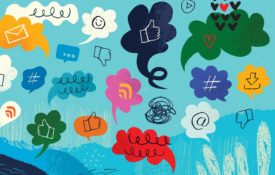-
What Happens to My Body During Dry January?
Q: What are the health effects of Dry January? Can cutting back on alcohol for a month have long-term benefits? Champagne, eggnog, mulled wine — for many, the holiday season is a time for celebration, which typically involves copious amounts of alcohol. So it’s no surprise that an estimated 15 to 19 percent of U.S. adults in recent years have pledged to participate in Dry January, or “Drynuary,” in an effort to atone for their December choices and, hopefully, slightly unpickle their livers. There’s been little research into what, exactly, a month off alcohol can do for your health.
-

Scientists Discuss How to Study the Psychology of Collectives, Not Just Individuals
In a set of articles appearing in Perspectives on Psychological Science, an international array of scientists discusses how the study of neighborhoods, work units, activist groups, and other collectives can help us better understand and respond to societal changes.
-

How Science Can Reward Cooperation, Not Just Individual Achievement
Two social scientists propose a different approach to scientific recognition and rewards: shifting the focus away from individual scientists and toward the larger groups in which scientists are embedded.
-

‘Forget I Said That’: The Evolutionary Drive to Disclose May Lead to Oversharing
The decision to share personal information may boil down to a battle between the drive for privacy and the drive to disclose, according to this recent article.
-
The Black Mamba Effect: Psychological Science Says Adopting an Alter Ego Boosts Confidence, Determination, and Performance
For years, whenever we asked each other for advice, my daughters and I often replied, "What would Granddaddy Haden do?" Usually, that would end the problem-solving: My dad would have chosen the hard way through, not the easy way out. "What would Granddaddy Haden do?" became shorthand for making a decision you could live with. While we didn't think of it that way, taking a step back to view a situation from his point of view was a form of self-distancing, helping us gain better control of our emotions and be more objective and logical.
-
How to Be Happy Growing Older
Next to one’s birthday, the passing of the calendar year induces us to reflect on the march of time in our life. This is not a welcome subject for many—which is perhaps why a lot of people simply redefine old age virtually out of existence. When Americans were asked in 2009 what “being old” means, the most popular response was turning 85. Yet the average life span in the United States in 2022 was only 76. Apparently, then, the average American dies nine years before getting old.

